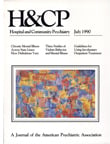Housing Homeless Women: A Consumer Preference Study
Abstract
Consumer preference surveys can provide valuable information on which to base the planning and development of housing for groups with special needs. The authors describe a survey that explored the housing histories, problems, needs, and preferences of a sample of 38 chronically homeless women contacted in metropolitan Toronto hostels and drop-in centers. Despite having multiple mental and physical health problems, the women showed a strong preference for a normal, independent living situation. However, they acknowledged the need for a range of supportive services to maintain themselves in such a situation. The women strongly opposed being housed in settings with mentally ill persons, with alcohol or drug abusers, and with those involved in criminal activities.
Access content
To read the fulltext, please use one of the options below to sign in or purchase access.- Personal login
- Institutional Login
- Sign in via OpenAthens
- Register for access
-
Please login/register if you wish to pair your device and check access availability.
Not a subscriber?
PsychiatryOnline subscription options offer access to the DSM-5 library, books, journals, CME, and patient resources. This all-in-one virtual library provides psychiatrists and mental health professionals with key resources for diagnosis, treatment, research, and professional development.
Need more help? PsychiatryOnline Customer Service may be reached by emailing [email protected] or by calling 800-368-5777 (in the U.S.) or 703-907-7322 (outside the U.S.).



